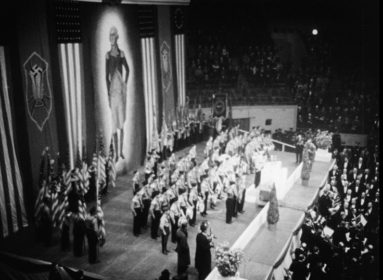By Judie Jacobson
Dan Raviv is a national correspondent for CBS News, heard regularly on the CBS Radio Network. He is also the author of several books, including the 1990 best seller “Every Spy a Prince: The Complete History of Israel’s Intelligence Community” and “Friends In Deed: Inside the U.S.-Israel Alliance,” both co-authored with Israeli journalist Yossi Melman, In their new book, “Spies Against Armageddon: Inside Israel’s Secret Wars,” published in July, Raviv and Melman, both veteran foreign affairs journalists, present a comprehensive history of Israel’s fascinating, feared and highly respected intelligence agencies, connecting new revelations about the past with Israeli strategies of today. The result is a thrilling tale that chronicles Israel’s ongoing war for survival, from early conflicts with Palestine to the newly emerging tensions with Iran.
Recently, the Ledger spoke with Dan Raviv about his new book and events unfolding in the Middle East today.
Q: What prompted you to write “Spies Against Armageddon?”
A: Above all a need for an update. My Israeli co-author Yossi Melman and I had done very well with our book “Every Spy A Prince,” but that was back in 1990. Yossi has continued to make Israeli security and espionage his specialty for Ha’aretz and other Israeli media, and I’ve done many things for CBS radio but continued to make Israel a focus. So, about four years ago he and I realized that many things have changed. So, we started the process about three years ago to see whether we could again get people talking about this subject and we found that we could — that we had good contacts. A lot of sources trust us. The only source that we reveal is this: old men. Many of these men were getting older and wanted to get their place in history or set the record straight. And that was the key – it was overwhelmingly old men. So, people told marvelous stories, though often they were reluctant to get too detailed, especially about recent operations, but we understood that. Yossi deals with the Israeli military censor almost every day and, in fact before publication we submitted everything and there were only very minor deletions demanded by the Israeli censor – nothing that affected our storytelling. I don’t think we reveal anything that’s dangerous to Israel.
 Q: Over the course of its history, what would you say is the Mossad’s greatest triumph and its biggest misstep or failure?
Q: Over the course of its history, what would you say is the Mossad’s greatest triumph and its biggest misstep or failure?
A: I think the biggest failure remains the Yom Kippur war in 1973. Israel was taken by surprise — but it didn’t have to be. We reveal new details concerning intelligence that the Mossad had gathered about Egyptian and Syrian moves toward war, but Israeli leaders did not want to believe it and Israel was caught in what analysts call “The Concept” that Arabs would not dare to attack Israel because they could not possibly win. But Israel had excellent spies in Cairo and information on Syrian intentions came from King Hussein of Jordan, who told the Israelis what he had observed and heard in Syria. There was a very tight relationship with King Hussein.
Q: Was that a failure of the Mossad – or a failure of the government to act upon the information the Mossad provided?
A: That’s a tough one – good for you that you’ve picked that apart. The Mossad had an excellent agent in Cairo and on the last day before the war – on Oct. 5, 1973 — this excellent agent, who was the late president Nasser’s son-in-law, Ashraf Marwan, met with the Mossad director in London and personally warned him that the Egyptian military is going to strike the next day. The Mossad chief believed him but couldn’t persuade the prime minister and the military that they had to do something – strike first, move all the defenses, etc. I’m reminded, though, of the Pearl Harbor attack and, unfortunately, I’m reminded of 9/11, where you could say, yes, the intelligence was picked up – U.S. military intelligence knew that Japanese ships were moving and knew of Japanese intentions but didn’t believe it – and, similarly, there were warnings about 9/11 and,of course, about Al Qaeda, but the CIA and FBI were not connecting the dots. So, yes, intelligence is gathered, but if it isn’t put into action it still adds up to a failure. That’s the Yom Kippur story.
Q: And Mossad triumphs?
A: There are so many. Certainly the Entebbe rescue, in which the Mossad and the military worked together. You know, Israeli intelligence is not only the Mossad. The Mossad is the most famous agency, but it works in concert with Israel’s military intelligence and with Israel’s special operations forces – notably, the uniformed soldiers of Sayeret Mat’cal, which is kind of like our Navy Seal Team Six. They’ve worked together so well for decades that rarely is there a feat or an achievement that belongs only to the Mossad. The Entebbe rescue struck a major blow against terrorism, showing what Israel can accomplish. Israel felt really low when the hostages were being held in Uganda…then suddenly there was a total turn-around of feeling and of spirit. That’s something that a covert operation rarely manages to do – lift the spirits of a whole country, while also rescuing about 100 people from terrorists. So I’m very impressed by that one.
When Israel strikes targets with great precision using its air force, all that is set up by terrific intelligence; it’s from the constant non-stop vigilance of Israeli intelligence. Some of the highlights I can think of include when Israel’s air force struck with great precision the Iraqi nuclear reactor in 1981, or even Yasir Arafat’s headquarters in Tunis in, I believe, 1985. Even more so, when Israel erased Syria’s nuclear reactor — it was the Israelis who spotted this building that was being built as a North Korean-style reactor in 2007 and brought it to the attention of the U.S. government. Rarely do we think about how many moving parts there are in developing the intelligence so you can accomplish these things.
Q: Speaking of Iran – you broke the now open secret that the Mossad has assassinated some top level Iranian nuclear scientists in order to delay the nuclear program in that country. Is that still going on? Has it helped?
A: When our book came out in early July, we made headlines by reporting that Israeli operatives of the Mossad had been going into Tehran and carrying out assassinations of nuclear scientists. That means, logically, that the Mossad has ways of getting in and getting out – they must have safe houses and they have the ability to ride motorcycles which have never been discovered by any Iranian authorities. Our research showed that Israel has been very active in Iran going back to before 1979 when the Shah was overthrown. Right now, given the big question of whether Israel and/or the U.S. will bomb Iran, it’s only reasonable to suppose that covert activity continues and probably in new and unexpected ways. I think the assassinations in Tehran have run their course. The Mossad sent its message that it’s dangerous to be a nuclear scientist in Tehran and Israeli analysts say that those operations did have the affect of many Iranian scientists feeling it’s too dangerous and therefore shying away from the country’s nuclear program. In addition, working with the U.S., Israeli intelligence came up with the Stuxnet virus and other means of sabotage. Another clever idea was feeding into Iran a lot of defective equipment. Anytime that Israel and the U.S., operating together, found out about companies in Asia or Europe that were selling parts and equipment to Iran’s nuclear program, the Americans and Israelis tried to get defective equipment into the pipeline and often they were successful.
I would underline that this is the Americans and Israelis working together, but in my research I found that the Americans did not like the assassination missions – that was purely Israeli.
Q: Why is that?
A: It seems to me that the CIA still is very reluctant about assassination missions. Of course, some people would point to the Osama bin Laden example – and there will be a lot about that now with the book coming out by one of the Navy Seals involved, because the U.S. government has never wanted to confirm that the mission was to kill bin Laden, even though he was one of the most notorious criminals of our time. What’s more, the CIA and the U.S. military have used drone aircraft to strike at terrorists in Afghanistan, Pakistan, Yemen and elsewhere — and I consider that to be an assassination mission. But planting explosives in a car or poisoning a target seems to be something the CIA is still reluctant to do. It’s out of its culture. Every agency has its culture, and the Israeli operations culture has included assassinations, often justified by veterans of the Mossad as being the cleanest and least violent way to get something done, with a minimum of collateral damage – a minimum of other people being killed or wounded – and often a way to avoid war. So, the Mossad and Israel’s top leaders felt that shaking up Iran’s nuclear program is a very high priority and the Mossad culture doesn’t shy away from targeted assassinations. The U.S. government barely hid its criticism of the assassinations in Tehran. There was at least one public statement and a few private statements that showed that the U.S. wasn’t comfortable with it.
Q: There were U.S. reports last week that Iran is now expanding its nuclear program underground. How do you think that news will affect Israel’s next step?
A: Israel’s defense minister Ehud Barak especially has spoken about what he calls the “Zone of Immunity” – a point the Iranian nuclear program will reach in which Israel can no longer cause enough damage to be meaningful. The most powerful part of his analysis is that Iran will move more than underground. So, it definitely affects Israeli thinking. It’s tied in with a demand by Prime Minister Netanyahu that the Obama Administration promised to attack Iran’s facilities if the Zone of Immunity is reached. Privately, U.S. officials have tried to assure Israel that Obama is totally against Iran going nuclear. Netanyahu wants a more explicit promise and now, because of the political calendar, the Israelis are trying to weigh what the difference would be if Obama wins or loses the November election. Israel is trying to create a situation where either way Israel still has a firm alliance with the U.S. and can depend on American backing.
It’s still a total mystery as to whether Netanyahu will conclude that Israel has to act on its own. The prime minister is certainly the leading figure – he is the decision maker – though he has told top Israeli politicians that he will turn to the Security Cabinet – a total of 14 ministers. Many ministers as well as intelligence and military chiefs in Israel have expressed a lot of hesitation about the wisdom of striking Iran. It was just announced that Netanyahu will visit the U.S. Sept. 27-30. His visit will include a speech to the UN General Assembly and I feel confident that he will also meet with the President.
Q: What has been the Mossad’s role in Egypt in recent days?
A: The change in Egypt is a major setback for Israel – but it’s not a failure of Israeli intelligence. The truth is that the Mossad and military intelligence did not expect Hosni Mubarak to fall last year. They thought he probably could survive and he would stay in office until the end of his life. But the intelligence analysts have told us that they knew Egypt would change eventually, and they were not confident about what would happen when he was gone. As for planning, the Israelis say they cannot affect what’s happening. They can only watch…as they are watching all the changes in the Arab countries in the so-called Arab Spring.
Syrian in particular is the most perplexing subject for Israeli intelligence and the political echelon. [Syrian President] Bashar Aa-Assad is a terrible enemy of Israel and a terrible dictator, but the Israelis feel that they totally understand him. Based on how Israel has had high level spies in both Israel and Syria in decades past, I assume that Israeli intelligence has had Damascus pretty well penetrated and Israeli intelligence feels safest when it understands what’s happening in an enemy capital. Now, Syria is so chaotic that even the Israelis can’t predict the outcome and they’re not sure what would be good and what would be bad. But in truth they can’t do much to effect the outcome. They’re watching intently – it’s a bordering country, it has chemical weapons, it has a very powerful arsenal of missiles. So, what happens in Syria is very meaningful. All in all, Israeli intelligence would have preferred that civil war not break out. It contains a lot of potential dangers for Israel.
Q: Do you think that Bibi Netanyahu has a pick in the upcoming U.S. presidential election?
A: Well, it’s clear that Bibi is closer to Mitt Romney. He’s more comfortable with him; he’s known him on and off for decades, going back to the years in Boston when they were both working as management consultants. And Israel’s assessment is that Romney is very friendly towards Israel – reminiscent of George W. Bush who agreed with almost everything that Ariel Sharon was doing in his time as Prime Minister. However, in the Israeli tradition, they understand Barack Obama and they have very strong military and intelligence cooperation with the Obama Administration. Netanyahu and Obama have a bitter disagreement over the future of Judaea and Samaria – the West Bank — Jewish housing in the territories and East Jerusalem. But on wider strategic issues they don’t differ much. They seem to have a personality clash and that doesn’t help relations, but the strategic cooperation has been good. Either way, the Israel/U.S. alliance can do well. As for standing up to Iran, the Israelis feel that Romney would agree with them, but they feel that Obama also has a clearly stated policy of stopping Iran from getting the nuclear bomb. So, again, the Israelis don’t feel they can do much to effect the outcome and, while Netanyahu would be more comfortable with Romney and would expect less criticism of Israeli moves in the years to come, Israel also feels on a strategic level it’s getting what it needs from the U.S. these days.
Q: Back to the Mossad – in your book, you talk a lot about the history of the Mossad. How do you think the Mossad has changed over the years?
A: The Mossad is still a small force — but a very potent, well-trained and clever one. The Israelis still pride themselves on being innovative and coming up with unexpected solutions to problems. The spirit is pretty much the same as it was in the 1950s when the agency was founded. But the focus of attention has really shifted. At the beginning, the focus was mainly on preparing for the next war. Ever since the end of the War of Independence, the Israelis knew that there were more wars around the corner. So, Israel had to prepare for war and also it had to build up the country’s Jewish population. As a result, a major part of Israeli intelligence was focused on secret immigration missions, which are truly unique to Israel and was very important in the first few decades in order both to build up Israel’s population as well as rescue Jews from countries where they had to get out: the Arab countries and later, Communist countries, as well as Ethiopia.
Later, the Mossad focused on Arab terrorism, mainly Palestinian terrorism, triggered by the Munich Olympics massacre in 1972. And so, the Mossad started an assassination squad – the Kidon Squad – which we’ve reported now has been busy in Iran as well. It was only eight years ago that the Mossad shifted its focus to Iran as the primary mission. The head of the Mossad, Mayer Dagan, and then Prime Minister Sharon, were aware that Iran had a nuclear program that was speeding up. They felt that this posed an existential threat to Israel and, anyway, that there wasn’t much more to do on the Palestinian front. Yassir Arafat and the Palestinian Authority had almost become boring. Israeli intelligence didn’t take its eye off of the Palestinians, but didn’t feel that it had much to do. Iran looked like it was a burning issue and that’s where most of the focus has been since 2004.
Comments? Email judiej@jewishledger.com








 Southern New England Jewish Ledger
Southern New England Jewish Ledger









